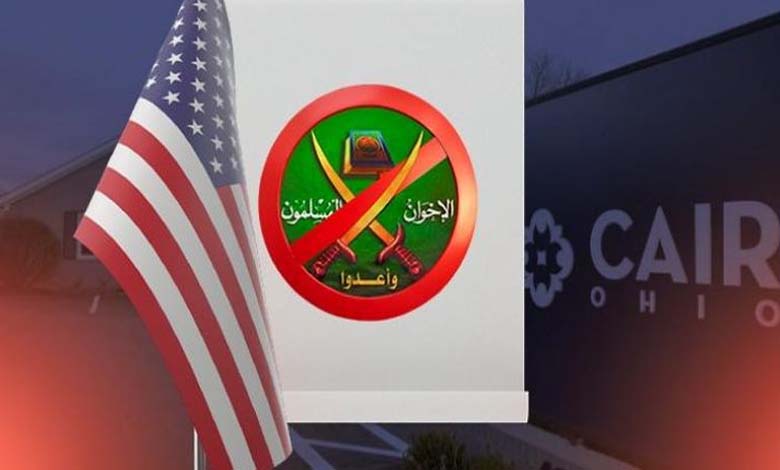Historic decision: Texas designates the Muslim Brotherhood and CAIR as terrorist entities

The state of Texas has sparked significant controversy after its governor, Greg Abbott, announced the designation of the Muslim Brotherhood and the Council on American-Islamic Relations (CAIR) as “terrorist organizations or entities with transnational criminal activity,” in a move with sensitive political and security implications both within the state and across the United States.
Abbott’s decision ignites debate on extremist threats
Governor Abbott conveyed his decision in an official statement, asserting that Texas would take new measures to what he described as “curbing the influence of extremist organizations,” considering the Muslim Brotherhood and CAIR as threats to public safety.
-
The Muslim Brotherhood in the U.S. Under Pressure… What’s Happening?
-
The Muslim Brotherhood and the specter of designation: a senior U.S. official calls for a decisive step
Today, I designated the Muslim Brotherhood and Council on American-Islamic Relations as foreign terrorist and transnational criminal organizations.
This bans them from buying or acquiring land in Texas and authorizes the Attorney General to sue to shut them down. pic.twitter.com/lSYvpkTmh3
— Greg Abbott (@GregAbbott_TX) November 18, 2025
Texas classifies the Muslim Brotherhood as a terrorist organization
Abbott emphasized that state law grants him the authority to designate entities he deems contrary to Texas’ security interests, noting that the decision is part of a broader strategy to counter what he describes as a threat from transnational organizations.
Wide-ranging implications despite the symbolic nature of the decision
According to an Axios report, the decision is more symbolic than directly executive but allows authorities to take additional steps, including halting any official cooperation with organizations suspected of links to these entities.
-
The Muslim Brotherhood Threatens U.S. Security… a Shocking Article in Newsweek
-
U.S. Congress Moves Closer to Designating Muslim Brotherhood as Terrorist Organization
It also permits restrictions on financial support and partnerships and lays the groundwork for potential future legal or administrative constraints within state institutions.
Strong criticism from CAIR: allegations of incitement and targeting Muslims
CAIR issued a strong statement describing Abbott’s decision as a “political act based on misleading and anti-Muslim information.”
The organization stated that the designation is invalid and unconstitutional and that it would explore the necessary legal steps to respond.
CAIR argued that the decision is part of a political campaign targeting American Muslims and exploiting security issues for electoral purposes.
-
Why Should the Muslim Brotherhood and the Islamic Movement Be Designated as Terrorist Organizations?
-
The Muslim Brotherhood in Saxony… the fall of Al-Jazzar exposes the movement’s crimes
Broader criticisms accuse the Muslim Brotherhood of exploiting the American climate
Axios notes that Texas’ designation reflects a belief among some U.S. institutions that the Muslim Brotherhood uses indirect political and legal tools to infiltrate communities, relying on advocacy and media fronts to build long-term influence.
The report adds that the state considers the timing appropriate to take a firm stance to limit these roles.
Texas continues hardline approach on security and immigration
The decision aligns with recent Texas policies, where Abbott has implemented a series of strict measures on border, immigration, and security legislation.
Observers believe the move also reflects a response to long-standing pressure from conservative groups within the state, demanding a tough stance on Islamic organizations.
-
Why America Needs a Thorough Investigation into the Muslim Brotherhood’s Activities
-
Muslim Brotherhood Collapsing: Video Exposes Mahmoud Hussein’s Manipulations and Leadership Struggles
Potential impact on relations with the Muslim community
Axios highlights that the designation could create tension between the Texas government and the local Muslim community, one of the fastest-growing communities in the state.
Local organizations, mosques, and community figures have expressed concern that the decision could foster a hostile climate, encouraging restrictions on Muslims’ civil and religious activities.
Today, I designated the Muslim Brotherhood and Council on American-Islamic Relations as foreign terrorist and transnational criminal organizations.
This bans them from buying or acquiring land in Texas and authorizes the Attorney General to sue to shut them down. pic.twitter.com/lSYvpkTmh3
— Greg Abbott (@GregAbbott_TX) November 18, 2025
Designation at odds with federal government stance
The report notes that the U.S. federal government has not classified the Muslim Brotherhood or CAIR as terrorist organizations, making Texas’ move a controversial exception within the American political system.
-
The Muslim Brotherhood under scrutiny: a persistent threat concealed behind democratic slogans
-
Between Caution and Allusion: How Western Media Portray the Muslim Brotherhood
Experts believe the decision could face significant legal challenges due to lack of evidence and potential conflict with federal law.
Ongoing dispute and endless debate over the Muslim Brotherhood
Axios reports that the issue of classifying the Muslim Brotherhood has been debated in the United States for years without federal action. Including CAIR in this designation represents an unprecedented escalation, particularly as the organization operates publicly within a legal framework and is recognized in the U.S. civil sphere.
-
The White House Guardian: U.S. Approves Sale of Advanced Air Defense Systems to Egypt
-
Switzerland Faces Growing Pressure to Confront the Muslim Brotherhood












